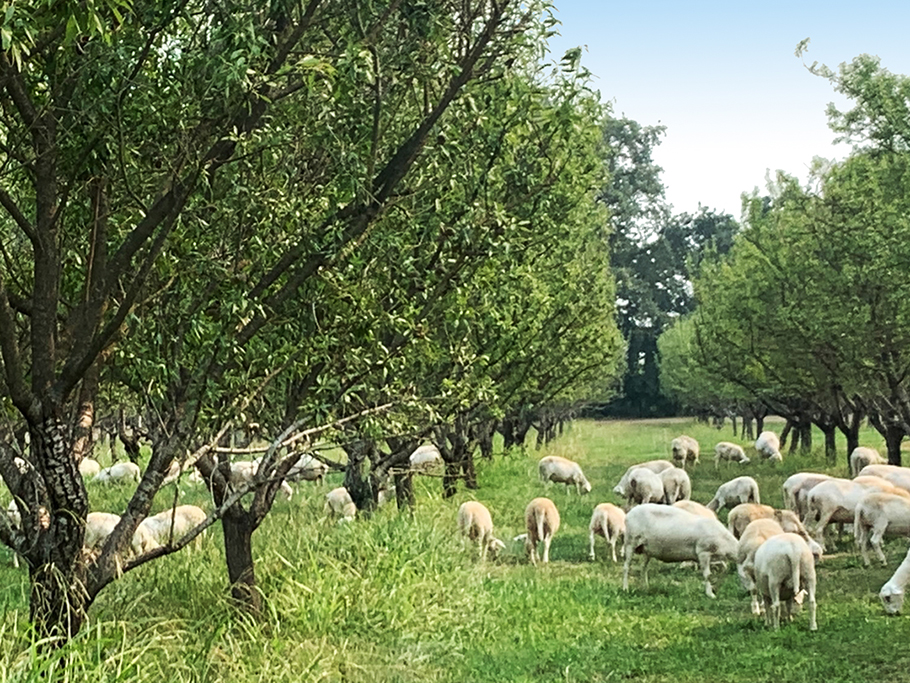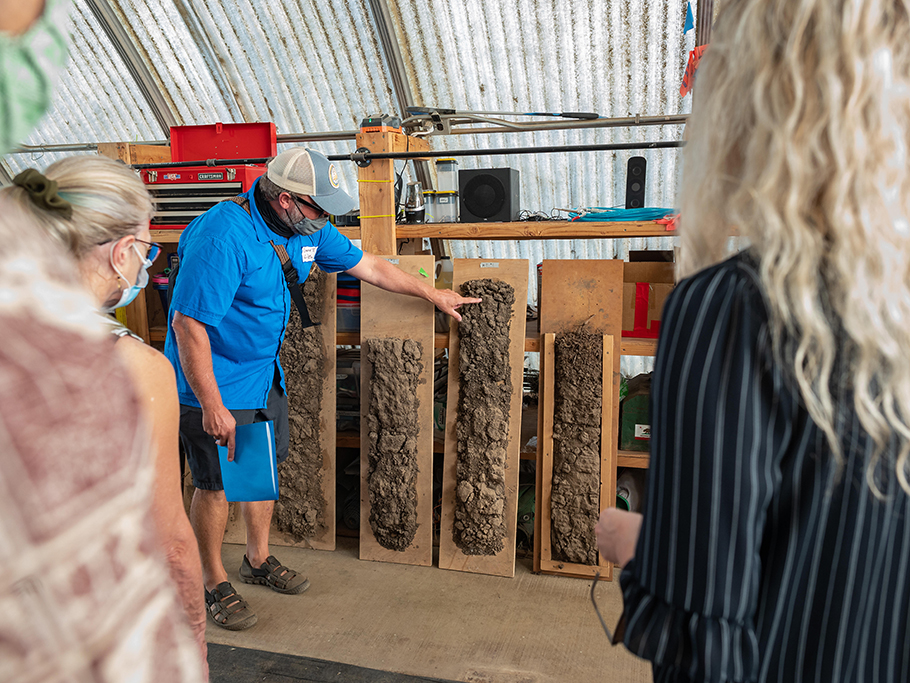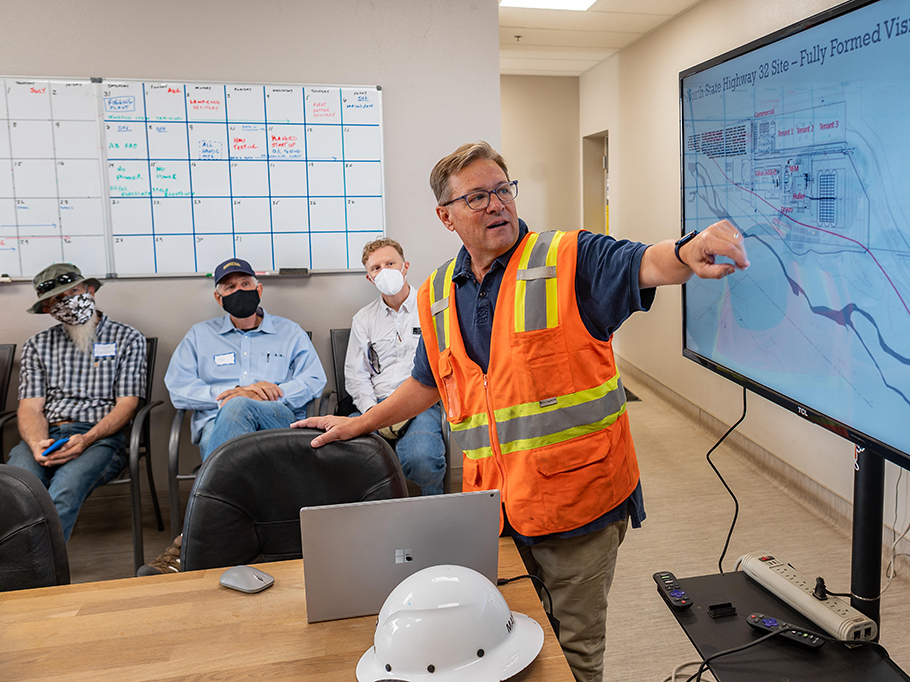
Regenerative Agriculture Farm Tour Generates Excitement About Projects in the North State
by Sheryl Karas M.A., CRARS staff

On Friday, August 20, 2021, CRARS sponsored a Regenerative Agriculture Farm Tour & Field Day for 50 people who joined us to visit multiple sites engaged in innovative regenerative agriculture research and practices in the Butte and Glenn County area. It was an opportunity for members of the leadership of Chico State and key players in the greater community to engage with members of our own leadership council while sharing the impact and potential of this work.
The University Farm
First stop of the day was the University Farm. After a welcome by Chico State President Gayle Hutchinson, tour participants were treated to an introduction to the Organic Dairy Program(opens in new window) with Dairy Manager Darby Heffner and CRARS Director Cindy Daley. The dairy is engaged in a 15-year program using stacked Regenerative Agriculture practices (compost applications; managed intensive grazing; no-till; and polyculture seeding). Results so far show improved soil organic matter of 2.6% and carbon sequestration of 50 T per year.
Next, Assistant Professor Logan Smith joined Cindy Daley in showing off the composting site which is producing 650 T of compost per year by recycling the waste from the dairy, beef, and sheep units. The Center is also experimenting with producing fungal dominant compost that may enhance the rate of carbon sequestration over traditional compost because of its rich biological diversity. Several research projects are currently underway to test that theory out.
The tour moved on to the 13 acre plot used by the Organic Vegetable Project(opens in new window). Farm Manager Scott Grist and Professor Jamal Javanmardi talked about the work being done on the three acres currently under cultivation. A research objective of the project is to grow, evaluate, and identify the most promising new vegetable varieties and the use of reduced or no-till tillage to enhance carbon capture. The vegetables produced are provided to Community Supported Agriculture members who paid to have a box of vegetables every week from April to December. Excess is supplied to the Wildcat Food Pantry on campus for students in need.

Associate Professor Garrett Liles and Staff Research Associate Seth Myrick provided a tour of the Soil Processing Area (the SPA)(opens in new window) and an introduction to Chico State’s Regenerative Agriculture Demonstration Lab (RAD Lab)(opens in new window). The lab will make soil carbon assessment and nutrient density assessment much more affordable and accessible while providing valuable educational and work experience for students. That will help growers more easily enter the carbon markets and gain more value for their efforts in transitioning to regenerative farming. We intend to help them develop comprehensive carbon farms plans. The data this lab provides will help them quantify the benefits of their practices so they can certify soil credits and sell those credits in the cap and trade markets.
Finally, Professors Jamal Javanmardi and Barry Pryor showed off the Farm’s new mushroom production systems for both standard button mushrooms and specialty ones. Mushroom growers are in some ways the ultimate regenerative recyclers as they take farm waste from other agriculture industry sectors and compost it into a substrate for growing mushrooms. Following the harvest, the substrate that produced the mushrooms can easily be recycled again for landscaping, home gardening (including potting soil), field or vegetable crops application, and various forms of reuse within the mushroom industry.
North State Hulling Cooperative and Local Farms

Next stop was North State Hulling Cooperative(opens in new window)’s facility where CEO Mayo Ryan provided a tour and introduction to their Carbon Neutral Almond Production Facility. He showed off their innovative dryer system, their net energy metering system, biochar production, and composting facility. UC Davis Associate Professor Amelie Gaudin and Cindy Daley discussed the Regenerative Agriculture Transition program and the NRCS Conservation Innovation Grant program Chico State will be doing cooperatively with UC Davis.
The tour bus then took people to California Olive Ranch(opens in new window). Ranch Manager Clayton Handy discussed their participation in the Regenerative Agriculture Transition program and Jared Geiser from the Glenn County Resource Conservation District discussed the CDFA Healthy Soils Project taking place at this site. Cindy Daley also did a water infiltration demonstration with Professor Garrett Liles.
Then everyone proceeded to Massa Organics(opens in new window), a farm that employs an integrated system of rice, almonds and livestock. Racquel Krach discussed her Master’s and CDFA Healthy Soils Project on the effects of compost application and cover crop planting on soil health, water use efficiency and crop production. She and Greg Massa provided a tour of their farm which included visiting the sheep who graze the cover crops under the trees in their almond orchard.
Last Stop
After a jam-packed day, the tour ended up at Almendra Winery and Distillery in Durham, CA. A social hour with appetizers and cocktails was enjoyed by all who could attend.
